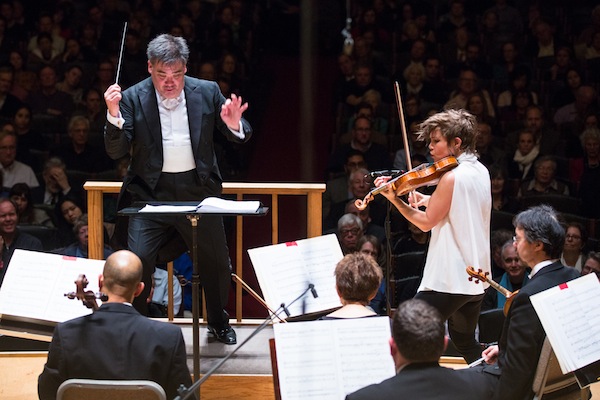Josefowicz, Gilbert and BSO deliver a dazzling John Adams premiere

Leila Josefowicz was the soloist in John Adams’ “Scheherazade.2” with Alan Gilbert conducting the Boston Symphony Orchestra Thursday night. Photo: Robert Torres.
Scheherazade.2 has finally come to Boston.
John Adams’ dramatic symphony for violin garnered critical acclaim after its premiere with the New York Philharmonic in March 2015. Since then it has become a popular concert item with orchestras around the globe.
Thursday night at Symphony Hall, violinist Leila Josefowicz and the Boston Symphony Orchestra, led by former New York Philharmonic conductor Alan Gilbert, delivered the work in its dazzling Boston premiere.
Like other of Adam’s scores, Scheherazade.2, which was written for and dedicated to Josefowicz, involves a social message. The composer got the idea for the 48-minute symphony after visiting an Arabian Nights exhibit while on a trip to Paris. The story of Scheherazade struck him not just for its imagery, but also for its moral dilemma: here was a woman trapped in a dangerous marriage who had to use her intellect to save her own life. Adams’ program note for Scheherazade.2 points to instances of violence against women, particularly in the Middle East. But the work also speaks to the current anti-sexual harassment “MeToo” movement that, in the world of classical music alone, has ended the careers of prominent conductors such as James Levine and Charles Dutoit.
But beyond its story and social justice message, the symphony’s contains some of Adams’ best music in recent years. Cast in four movements, Scheherazade.2 pits the titular character—symbolized by the violin—against groups of men who attempt to subdue her.
Scheherazade.2 is not only colorfully orchestrated, it extends the classical-romantic tradition through extremes of tension and release. To deliver such palpable drama, the work possesses some of Adams’ most daring harmonic writing to date. Cluster chords pulse in the second movement and give way to bursts of sound from the brass. Smears of wind and string color open the work, and the cimbalom, played deftly by Chester Englander, adds touches of metallic sound.
Josefowicz’s solos drive much of the work’s themes. Playing with gleaming tone and fiery intensity, the violinist tossed off the part’s gnarly double- and triple-stops with aplomb. For a brief moment in the second movement, “A Long Desire,” her phrases took on a rosy tone quality. But the symphony never really quiets down, and Josefowicz and the orchestra kept the music driving ever forward.
The third movement, “Scheherazade and the Men with Beards,” unfolds with propulsive rhythm, a distinct feature of much of Adams’ music. Josefowicz’s violin and the brass traded passages of biting intensity in the climactic moments. Sawing passages for the soloist erupted in the final movement before giving way to a final moment of repose at the symphony’s end. There, Josefowicz’s phrase glowed like a voice free from constraint. Scheherazade, it seemed, had escaped her fate.
Alan Gilbert drew playing of surging energy to match Josefowicz’s live-wire performance, and the BSO responded with both beautiful and robust playing. Scheherazade.2 is the most important new work by America’s most celebrated composer, and this rendering will linger in memory.
The first half of the concert was dedicated to music by Sibelius and Debussy.
Like much of the Finnish composer’s music, Sibelius’ sEn saga paints a picture of cold northern landscapes. In Gilbert’s reading, the work unfolded in soft, sweeping phrases through which winds peeked out like sunshine through cloud. Strings took on a dusky quality for the principal theme, but throughout, Gilbert’s reading had inviting warmth of tone. String and wind phrases wrapped William R. Hudgins’ clarinet solo in a soft blanket of sound.
Thursday’s performance of Debussy’s Jeux was similarly sensitive. The score, which accompanied a ballet about a tennis match, was eclipsed by the later success (and initial infamy) of Stravinsky’s Rite of Spring, which premiered only a few weeks after Jeux in Paris in 1913. But Jeux is a sparkling and energetic work all its own, bolder in texture than Debussy’s more popular La Mer and Images.
Gilbert kept the tempos flowing gracefully, the music’s phrases cresting and breaking like waves. Balances, too, were well-judged and allowed Debussy’s colors to change on a dime. The silvery string chords that evaporated into Malcolm Lowe’s bright-toned violin solo were a particular highlight.
The program will be repeated 1:30 p.m. Friday and 8 p.m. Saturday at Symphony Hall. bso.org; 888-266-1200
Posted in Performances





Posted Mar 03, 2018 at 10:24 am by Jim Doherty
When Alan Gilbert puts together a program, each piece speaks to the others. Too bad that the reviewer didn’t notice how these three piece spoke to each other.